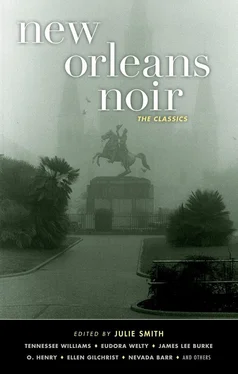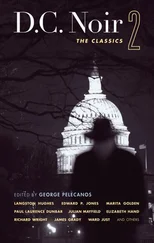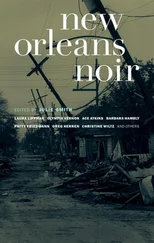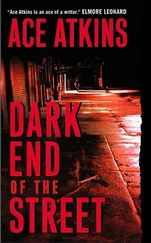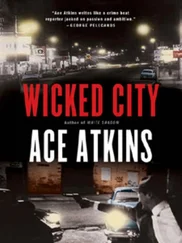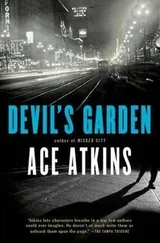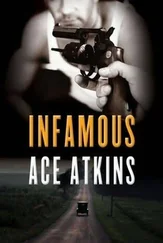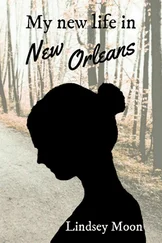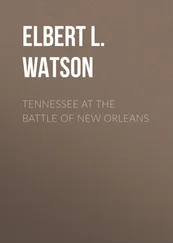Ace Atkins - New Orleans Noir - The Classics
Здесь есть возможность читать онлайн «Ace Atkins - New Orleans Noir - The Classics» весь текст электронной книги совершенно бесплатно (целиком полную версию без сокращений). В некоторых случаях можно слушать аудио, скачать через торрент в формате fb2 и присутствует краткое содержание. Город: New York, Год выпуска: 2016, ISBN: 2016, Издательство: Akashic Books, Жанр: Детектив, на английском языке. Описание произведения, (предисловие) а так же отзывы посетителей доступны на портале библиотеки ЛибКат.
- Название:New Orleans Noir: The Classics
- Автор:
- Издательство:Akashic Books
- Жанр:
- Год:2016
- Город:New York
- ISBN:978-1-61775-384-8
- Рейтинг книги:3 / 5. Голосов: 1
-
Избранное:Добавить в избранное
- Отзывы:
-
Ваша оценка:
- 60
- 1
- 2
- 3
- 4
- 5
New Orleans Noir: The Classics: краткое содержание, описание и аннотация
Предлагаем к чтению аннотацию, описание, краткое содержание или предисловие (зависит от того, что написал сам автор книги «New Orleans Noir: The Classics»). Если вы не нашли необходимую информацию о книге — напишите в комментариях, мы постараемся отыскать её.
takes a literary tour through some of the darkest writing in New Orleans history.
New Orleans Noir: The Classics — читать онлайн бесплатно полную книгу (весь текст) целиком
Ниже представлен текст книги, разбитый по страницам. Система сохранения места последней прочитанной страницы, позволяет с удобством читать онлайн бесплатно книгу «New Orleans Noir: The Classics», без необходимости каждый раз заново искать на чём Вы остановились. Поставьте закладку, и сможете в любой момент перейти на страницу, на которой закончили чтение.
Интервал:
Закладка:
— Congenital syphilis, Tumulty said. — It incubates for years, sometimes. She was in high school. Now she’s here. It’s easier for her now than at first. Most of her mind is gone. In a year she’ll be dead.
He paused by a barred window, and looked out on the rolling Louisiana countryside beyond the distant fence. — About graduation time.
— There’s no treatment...?
— The cure is dying.
What I can remember of the untidy wards is fragmentary. The stench was very bad, the sounds were nonhuman, and the inmates, divided by sex, were naked in large concrete rooms, sitting on the damp floors, unable to control their bodily functions, obese mostly, and utterly asexual with tiny misshappen heads. There were benches along the sides of the concrete rooms, and the floors sloped down to a central caged drain in the center. One of the things — I mean inmates — was down trying slowly, in a fashion almost reptilian, to lick up filthy moisture from the drain. Another was chewing on a plastic bracelet by which it was identified. Most of the rest, young and older, sat on the benches or the floor staring at nothing, blubbering once in a while, scratching occasionally.
— Once, Dr. Tumulty said thoughtfully, — a legislator came. A budgetary inspection. We didn’t get any more money. But he complained that we identified the untidy patients by number. He came and saw everything, and that’s... what bothered him.
By then we were outside again, walking in the cool Louisiana summer morning. We had been inside less than an hour. I had thought it longer.
— It’s the same everywhere. Massachusetts, Wyoming, Texas. Don’t think badly of us. There’s no money, no personnel, and even if there were...
— Then you could only... cover it.
— Cosmetics, yes. I’ve been in this work for eighteen years. I’ve never forgotten anything I saw. Not anything. You know what I think? What I really know?
— ...?
Tumulty paused and rubbed his hands together. He shivered a little, that sudden inexplicable thrill of cold inside that has no relationship to the temperature in the world, that represents, according to the old story, someone walking across the ground where your grave will one day be. A mockingbird flashed past us, a dark blur of gray, touched with the white of its wings. Tumulty started to say something, then shrugged and pointed at a small building a little way off.
— They’re over there. One of the attendants will show you.
He looked from one building to another, shaking his head. — There’s so much to do. So many of them...
— Yes, I said. — Thank you. Then I began walking toward the building he had indicated.
— Do... whatever you can... for her, Dr. Tumulty called after me. — I wish...
I turned back toward him. We stood perhaps thirty yards apart then. — Was there... something else you wanted to say? I asked.
He looked at me for a long moment, then away. — No, he said. — Nothing.
I stood there as he walked back into the clutter of central buildings, and finally vanished into one of them. Then, before I walked back to join Irma, I found a bench under an old magnolia and sat down for a few minutes. It was on the way to becoming warm now, and the sun’s softness and the morning breeze were both going rapidly. The sky was absolutely clear, and by noon it would be very hot indeed. A few people were moving across the grounds. A nurse carrying something on a tray, two attendants talking animatedly to each other, one gesturing madly. Another attendant was herding a patient toward the medical building. It was a black inmate, male or female I could not say, since all the patients’ heads were close-cropped for hygienic purposes, and the coverall obscured any other sign of sex. It staggered from one side of the cinder path to the other, swaying as if it were negotiating the deck of a ship in heavy weather out on the Gulf. Its arms flailed, seeking a balance it could never attain, and its eyes seemed to be seeking some point of reference in a world awash. But there was no point, the trees whirling and the buildings losing their way, and so the thing looked skyward, squinted terribly at the sun, pointed upward toward that brazen glory, almost fell down, its contorted black face now fixed undeviatingly toward that burning place in the sky which did not shift and whirl. But the attendant took its shoulder and urged it along, since it could not make its way on earth staring into the sky.
As it passed by my bench, it saw me, gestured at me, leaned in my direction amidst its stumblings, its dark face twinkling with sweat.
— No, Hollis, I heard the attendant say as the thing and I exchanged a long glance amidst the swirling trees, the spinning buildings, out there on the stormy Gulf. Then it grinned, its white teeth sparkling, its eyes almost pulled shut from the effort of grimace, its twisted fingers spieling a language both of us could grasp.
— Come on, Hollis, the attendant said impatiently, and the thing reared its head and turned away. No more time for me. It took a step or two, fell, and rolled in the grass, grunting, making sounds like I had never heard. — Hollis, I swear to God, the attendant said mildly, and helped the messenger to its feet once more.
The nurse in the building Tumulty had pointed out looked at me questioningly. — I’m looking for... Mrs. Bedlow.
— You’ll have to wait... she began, and then her expression changed. — Oh, you must be the one. I knew I’d forgotten something. All right, straight back and to the left. Ward Three.
I walked down a long corridor with lights on the ceiling, each behind its wire cover. I wondered if Hollis might have been the reason for the precaution. Had he or she or it once leaped upward at the light, clawing, grasping, attempting to touch the sun? The walls were covered with an ugly pale yellow enamel which had begun peeling long ago, and the smell of cheap pine-scented deodorizer did not cover the deep ingrained stench of urine, much older than the blistered paint. Ward Three was a narrow dormitory filled with small beds. My eyes scanned the beds and I almost turned back, ready for the untidy wards again. Because here were the small children — what had been intended as children.
Down almost at the end of the ward, I saw Irma. She was seated in a visitor’s chair, and in her arms was a child with a head larger than hers. It was gesticulating frantically, and I could hear its sounds the length of the ward. She held it close and whispered to it, kissed it, held it close, and as she drew it to her, the sounds became almost frantic. They were not human sounds. They were Hollis’s sounds, and as I walked the length of the ward, I thought I knew what Tumulty had been about to say before he had thought better of it.
— Hello, Irma said. The child in her arms paused in its snufflings and looked up at me from huge unfocused eyes. Its tongue stood out, and it appeared that its lower jaw was congenitally dislocated. Saliva ran down the flap of flesh where you and I have lips, and Irma paid no mind as it dripped on her dress. It would have been pointless to wipe the child’s mouth because the flow did not stop, nor did the discharge from its bulging, unblinking eyes. I looked at Irma. Her smile was genuine.
— This is... I began.
— Albert Sidney, she finished. — Oh, no. I wish it were. This is Barry. Say hello.
The child grunted and buried its head in her lap, sliding down to the floor and crawling behind her chair.
— You... wish...?
— This is Albert Sidney, she said, turning to the bed next to her chair.
He lay there motionless, the sheet drawn up to what might have been the region of his chin. His head was very large, and bulged out to one side in a way that I would never have supposed could support life. Where his eyes should have been, two blank white surfaces of solid cataract seemed to float lidless and intent. He had no nose, only a small hole surgically created, I think, and ringed with discharge. His mouth was a slash in the right side of his cheek, at least two inches over and up from where mouths belong. Irma stepped over beside him, and as she reached down and kissed him, rearranged the sheets, I saw one of his hands. It was a fingerless club of flesh dotted almost randomly with bits of fingernail.
Читать дальшеИнтервал:
Закладка:
Похожие книги на «New Orleans Noir: The Classics»
Представляем Вашему вниманию похожие книги на «New Orleans Noir: The Classics» списком для выбора. Мы отобрали схожую по названию и смыслу литературу в надежде предоставить читателям больше вариантов отыскать новые, интересные, ещё непрочитанные произведения.
Обсуждение, отзывы о книге «New Orleans Noir: The Classics» и просто собственные мнения читателей. Оставьте ваши комментарии, напишите, что Вы думаете о произведении, его смысле или главных героях. Укажите что конкретно понравилось, а что нет, и почему Вы так считаете.
